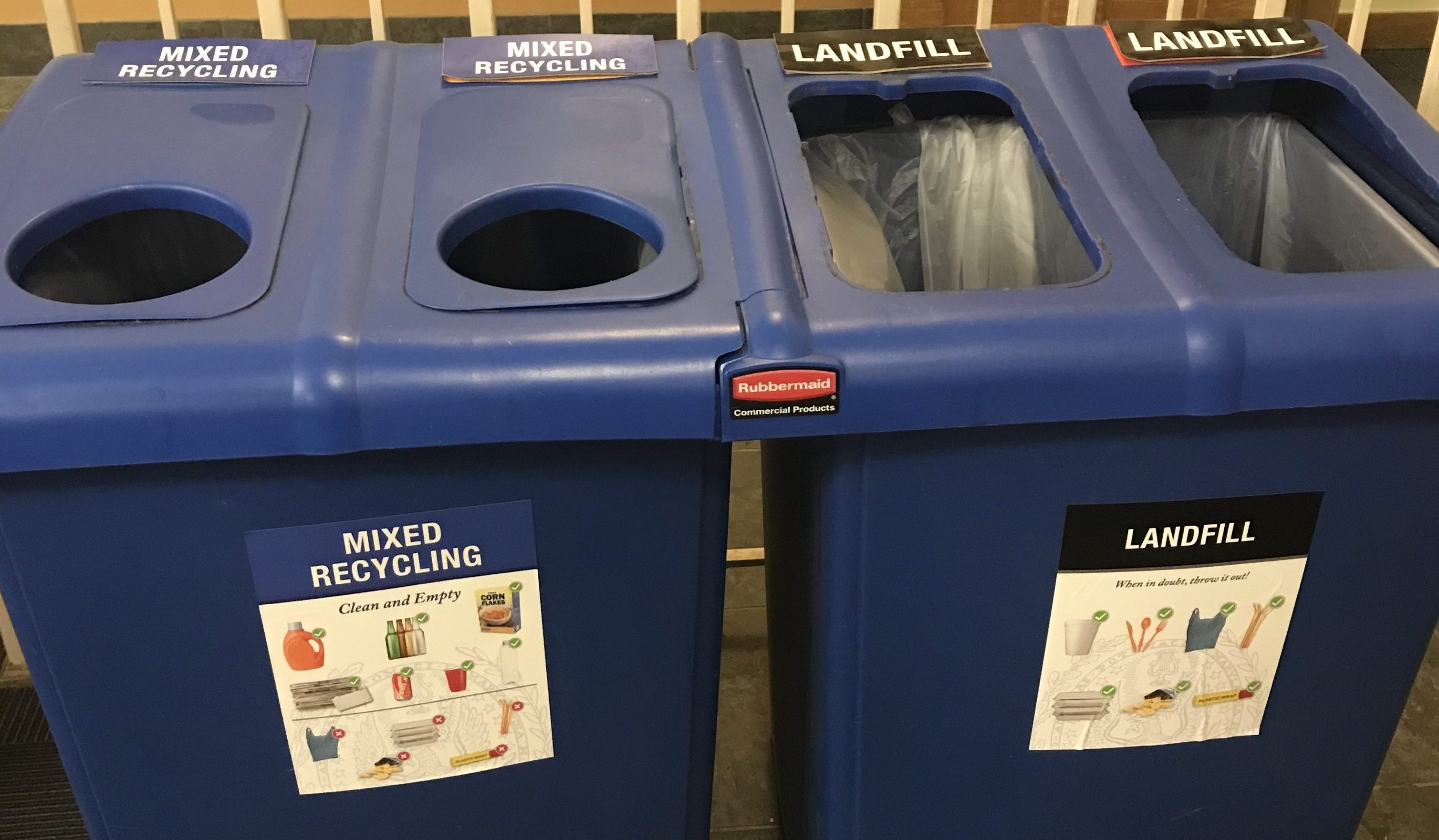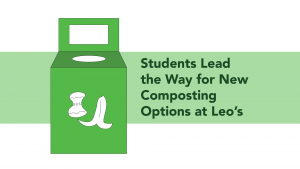The university, in conjunction with Georgetown Renewable Energy and Environmental Network (GREEN), updated waste collection bin signage in the Southwest Quad and Village A as part of a pilot single-stream recycling program this semester.
The pilot program came out of a meeting between the heads of the Office of Sustainability, Office of Planning and Facilities Management, and members of GREEN on the future of university recycling. “Earlier this school year, the university met with students from GREEN to discuss the benefits of single-stream and multi-stream recycling,” a university spokesperson wrote in a statement to the Voice. “GREEN advocated for a single-stream program due to the convenience for faculty, staff, and students.”
Samantha Panchèvre (SFS ’19), chair of the Georgetown University Student Association (GUSA) Sustainability Committee, wrote in an email to the Voice that she feels the current signage makes it difficult to follow proper recycling practices. “The current waste system is a frustration for many students because inconsistent bin designs and labeling make it difficult to sort out trash from recycling,” Panchèvre wrote.
The new signage on the bins in the Southwest Quad clearly delineates the compartments containing waste going to a landfill and to a recycling facility. The mixed recycling label contains visual aids to show students what items are allowed, such as detergent containers, cereal boxes, and newspapers, and which items, including plastic bags and food, are not. In Village A, the separate receptacles for mixed paper, glass and plastic, and cans have been replaced by bins with signage reading, “Mixed Recycling.”
Panchèvre feels increasing the numbers of bins with the new labels is an important step in addressing the issue of improper recycling practices on campus. “One of the greatest barriers to recycling though is contamination of the recycling stream, which is why it is important that the new recycling program expands and more bins on campus get relabeled,” Panchèvre wrote.
Another element of the pilot program will be educational programming published by the Office of Sustainability for residents, custodians, and dining employees.
Representatives from the Office of Sustainability, Planning and Facilities Management, Auxiliary Business Services, Aramark, Residential Living, and students from GREEN will continue working together to determine the effectiveness of the new recycling program and explore ways Georgetown can continue improving recycling educational efforts and programs, a university spokesperson wrote.
The Office of Sustainability has partnered with GUSA Sustainability for the Go-Plastic-Free campaign, which encourages students and campus organizations to reduce single-use plastic waste and to make their events more sustainable. Part of the initiative will be distribution of the Office of Sustainability’s new digital Green Events Guide after spring break. It offers tips for sustainable event planning and includes resources that encourage proper recycling, such as labels that students can print out to put on bins and contact info for caterers who offer composting services.
A team from Planning and Facilities Management has been working alongside interns from the Office of Sustainability to prepare new options for indoor recycling bins for residential and public spaces. The initial focus will be replacing older bins in common spaces like lobbies and student lounges. Elements that the team is taking into consideration are capacity, aesthetics, ease of custodial use, and cost. The team will be seeking input on the proposed designs from members of GREEN following spring break.
GREEN is currently working on multiple campus education campaigns to educate the student body about recycling on campus. “First and foremost, we are working to finally dispel the rumor that Georgetown doesn’t recycle and to re-educate the student population on proper recycling techniques,” Nareg Kuyumjian (SFS ’21), president of GREEN, wrote in an email to the Voice.
Other initiatives include an art installation that will be made of trash that students mis-sorted into recycling bins, as well as presentation guidelines for NSO Orientation Advisors to ensure first-year students understand how to recycle and why it is important.
GREEN believes the pilot recycling program is an important step in the club’s long-term goal of encouraging members of this campus to move away from producing non-repurposable, non-reusable waste, to decrease their use of single-use plastics, and more broadly, to change the culture from complacency to awareness.
“Recycling and waste management as a whole is one of the most important issue areas we are tackling on campus,” Kuyumjian wrote. “We believe that recycling is the most rudimentary way to increase consciousness about our everyday environmental footprint.”







[…] In recent semesters, Georgetown has made strides to uphold its end of the bargain. New developments including a new recycling pilot program and the improvement of recycling bin labeling aim to […]